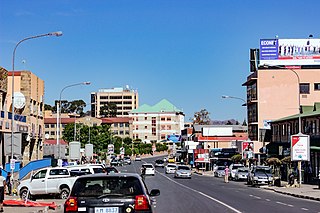Related Research Articles

Lesotho, formally the Kingdom of Lesotho, is a landlocked country in Southern Africa. As an enclave of South Africa, with which it shares a 1,106 km (687 mi) border, it is the largest sovereign enclave in the world, and the only one outside of the Italian Peninsula. It is situated in the Maloti Mountains and contains the highest peak in Southern Africa. It has an area of over 30,000 km2 (11,600 sq mi) and has a population of about two million. Its capital and largest city is Maseru. The country is also known by the nickname The Mountain Kingdom.

The economy of Lesotho is based on tourism, manufacturing, mining, and agriculture, and depends heavily on remittances from its diaspora. Lesotho, a lower middle income country, is geographically surrounded by South Africa and is economically integrated with it as well. A significant portion of the population subsists on farming with a gradual ongoing transition into tourism and manufacturing.
This article concerns systems of transport in Lesotho. As a landlocked country, Lesotho has no seaports or harbours, but does have road, air transport, and limited rail infrastructure.

A convenience store, convenience shop, bodega, corner store, corner shop, or superette is a small retail store that stocks a range of everyday items such as tea, coffee, groceries, fruits, vegetables, snacks, confectionery, soft drinks, ice creams, tobacco products, lottery tickets, over-the-counter drugs, toiletries, newspapers and magazines.
7-Eleven, Inc. is a convenience store chain, headquartered in Irving, Texas. The chain was founded in 1927 as an ice house storefront in Dallas. It was named Tote'm Stores between 1928 and 1946. After Ito-Yokado, a Japanese supermarket chain and the parent company of Seven-Eleven Japan, acquired a 70% stake in the company in 1991, the company became a wholly owned subsidiary of Seven-Eleven Japan in November 2005. The chain is owned by Japanese company Seven & I Holdings through Seven-Eleven Japan Co., Ltd.

Maseru is the capital and largest city of Lesotho. It is also the capital of the Maseru District. Located on the Caledon River, Maseru lies directly on the Lesotho–South Africa border. Maseru had a population of 330,760 in the 2016 census. The city was established as a police camp and assigned as the capital after the country became a British protectorate in 1869. When the country achieved independence in 1966, Maseru retained its status as capital. The name of the city is a Sesotho word meaning "red sandstones".

Land reform is a form of agrarian reform involving the changing of laws, regulations, or customs regarding land ownership. Land reform may consist of a government-initiated or government-backed property redistribution, generally of agricultural land. Land reform can, therefore, refer to transfer of ownership from the more powerful to the less powerful, such as from a relatively small number of wealthy or noble owners with extensive land holdings to individual ownership by those who work the land. Such transfers of ownership may be with or without compensation; compensation may vary from token amounts to the full value of the land.

The Sotho, also known as the Basotho, are a Sotho-Tswana ethnic group native to Southern Africa. They primarily inhabit the regions of Lesotho and South Africa.

99 Ranch Market is an American supermarket chain owned by Tawa Supermarket Inc., which is based in Buena Park, California. 99 Ranch has 58 stores in the U.S., primarily in California, with other stores in Nevada, Oregon, Washington, New Jersey, Texas, Maryland, Massachusetts, Arizona, and Virginia. The company also started offering shopping via its website in 2014. In February 2021, the company also launched their mobile app for grocery delivery.

In non-Asian countries, an Asian supermarket largely describes a category of grocery stores that focuses and stocks items and products imported from countries located in the Far East.
Chinese South Africans are Overseas Chinese who reside in South Africa, including those whose ancestors came to South Africa in the early 20th century until Chinese immigration was banned under the Chinese Exclusion Act of 1904. Chinese industrialists from the Republic of China (Taiwan) who arrived in the 1970s, 1980s and early 1990s, and post-apartheid immigrants to South Africa now outnumber locally-born Chinese South Africans.

Philadelphia Chinatown is a predominantly Asian American neighborhood in Center City, Philadelphia, Pennsylvania. The Philadelphia Chinatown Development Corporation supports the area. The neighborhood stretches from Vine Street on the north, Arch Street on the south, North Franklin Street and N. 7th Street on the east, to North Broad Street on the west.

Taiwanese night markets are night markets in Taiwan that operate in urban or suburban areas between sunset and sunrise. A few, such as Huaxi Street Tourist Night Market, use purpose-built marketplaces, but most occupy either sidewalks or even entire streets that carry vehicle and pedestrian traffic by day. Some night markets in smaller side streets and alleys feature retractable roofs. Most night markets operate daily and feature a mixture of individual stalls selling clothing, consumer goods, xiaochi, and specialty drinks. The atmosphere is usually crowded and noisy with hawkers shouting and fast-paced music playing over loudspeakers. Taiwanese night markets have evolved over the years from small, local gatherings to noisy streets lined with vendors, who must adhere to regulations placed on their activities by the Taiwanese government.
Honorary whites was a political term that was used by the apartheid regime of South Africa to grant some of the rights and privileges of whites to those who would otherwise have been treated as non-whites under the Population Registration Act. It was enacted by the then ruling National Party (NP).

Edcon Limited was a retail company based in Johannesburg, South Africa. Its subsidiaries included Edgars, a department store with 203 branches. In 2020, the Competition Tribunal approved the sale of the Edgars division to Retailability (pty) Ltd, and Jet to The Foschini Group.
Professor Eugenia Shi-Chia Chang is a Member of Parliament of the Inkatha Freedom Party in the National Assembly of the Republic of South Africa.
Chinese people in Madagascar are a minority ethnic group of Madagascar and form Africa's third largest overseas Chinese population with a population estimated at between 70,000 and 100,000 in 2011. They are divided between local Chinese population called "Sinoa zanatany" who arrived during the french colonization, speaking mostly malagasy dialects, located in eastern and southeastern part of Madagascar and post-colonial chinese migrants speaking mostly Mandarin who live mainly in the capital Antananarivo.

The People's Republic of China and Lesotho maintain historical, political, economic, trade, aid, healthcare and migration connections.

Lau Ah Kok or Lau Gim Kok, was a Bruneian nobleman and businessman of Chinese descent who was known for establishing Hua Ho Department Store, a well-known local supermarket and department store chain as well as an agricultural farm in Brunei. He was considered to be among the richest people in Brunei.

In 2017, 1.1 million women were living in Lesotho, making up 51.48% of the population. 33% of women are under 15 years of age, 61.4% are between 15 and 64 years old and 5.3% are over 64 years old. They received full legal status in 2008 with the passage of The Lesotho Bank Savings and Development Act of 2008. Women in Lesotho die at a disproportionate rate from HIV/AIDs. Historically, women have wielded power as heads of households, with control over household financial decisions. The government has taken steps to ensure more equal representation of genders in government with quotas, and women in Lesotho are more highly educated than men. Still, domestic abuse, sexual violence, lack of social mobility, and aforementioned health crises are persistent issues. Social and economic movements, like the mass immigration of men to South Africa, and the rise of the garment industry, have contributed to both the progress and problems facing women in Lesotho today.
References
- 1 2 3 4 5 "Chinese businesses rile Lesotho locals", Marketplace, 15 January 2008[ permanent dead link ]
- 1 2 "Lesotho meets China", The Economist, 5 August 2010
- ↑ "Chinese businesses rile Lesotho locals", Lesotho Times, 23 June 2011